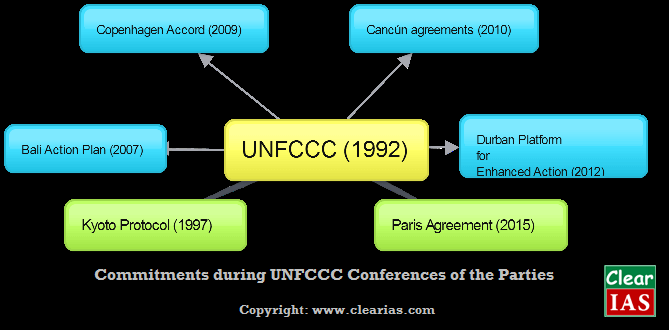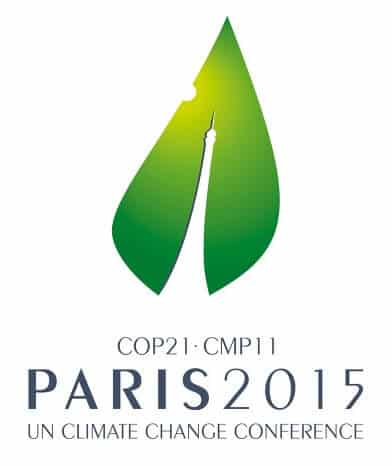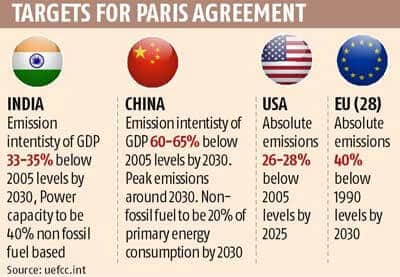Paris Agreement: Simplified

‘Paris Agreement’ is mentioned whenever someone speaks about ‘climate change’ or ‘global warming’. Why is Paris Agreement so important? This post is a beginner’s guide to Paris Agreement (2015).
Table of Contents
Climate Change: a reality?

- Mostly because of human actions, the concentration of gases like Carbon-di-oxide, Methane etc has increased in earth’s atmosphere and has resulted in phenomena called Green House Effect.
- Because of Green House Effect, the average global temperature has increased, which is known as Global Warming.
- The 2016 average temperatures were about 1.3 °C (2.3 degrees Fahrenheit) above the average in 1880 when global record-keeping began.
- It is estimated that the difference between today’s temperature and the last ice age is about 5°C.
- Global Warming is dangerous all life on earth.
- The only way to deal with the change in climate is to reduce the emission of Green House Gases (GHGs) like Carbon Di Oxide and Methane.
What is Paris Agreement?

- In short, Paris Agreement is an international agreement to combat climate change.
- From 30 November to 11 December 2015, the governments of 195 nations gathered in Paris, France, and discussed a possible new global agreement on climate change, aimed at reducing global greenhouse gas emissions and thus reduce the threat of dangerous climate change.
- The 32-page Paris agreement with 29 articles is widely recognized as a historic deal to stop global warming.
Aims of Paris Agreement
As countries around the world recognized that climate change is a reality, they came together to sign a historic deal to combat climate change – Paris Agreement. The aims of Paris Agreement is as below:
- Keep the global temperature rise this century well below 2 degrees Celsius above the pre-industrial level.
- Pursue efforts to limit the temperature increase even further to 1.5 degrees Celsius.
- Strengthen the ability of countries to deal with the impacts of climate change.
It may seem a small change in temperature but this can mean a big difference for the Earth!
Paris Agreement: Things to note
- In French, the Paris Agreement is known as L’accord de Paris.
- The key vision of Paris Agreement is to keep global temperatures “well below” 2.0C (3.6F) above pre-industrial times and “endeavour to limit” them even more, to 1.5C.
- Paris Accord talks about limiting the amount of greenhouse gases emitted by human activity to the same levels that trees, soil and oceans can absorb naturally, beginning at some point between 2050 and 2100.
- It also mentions the need to review each country’s contribution to cutting emissions every five years so they scale up to the challenge.
- Rich countries should help poorer nations by providing “climate finance” to adapt to climate change and switch to renewable energy.
- The Paris Agreement has a ‘bottom up’ structure in contrast to most international environmental law treaties which are ‘top down.
- The agreement is binding in some elements like reporting requirements, while leaving other aspects of the deal such as the setting of emissions targets for any individual country as non-binding.
- Note: You can download the Paris Agreement from this link.
Is this the first international agreement to combat climate change due to global warming?
No. In fact, Paris Agreement comes under the broad umbrella of United Nations Framework Convention on Climate Change (UNFCCC). UNFCCC is a convention held in 1992 to combat climate change. Kyoto Protocol (1997) was another major international commitment under UNFCCC.
👉 Which year are YOU targeting for success in the IAS/IPS/IFS Exam? 🚀
 UNFCC and Paris Agreement" width="669" height="330" />
UNFCC and Paris Agreement" width="669" height="330" />
Paris Agreement (2015) vs Kyoto Protocol (1997)
- Paris Agreement is the world’s first comprehensive climate agreement. Although developed and developing countries were parties to Kyoto Protocol, developing countries were not mandated to reduce their emissions.
- This means that while Paris Agreement is legally binding to all parties, Kyoto Protocol was not.
- Paris Agreement was reached on the twenty-first session of the Conference of the Parties (COP) and the eleventh session of the Conference of the Parties serving as the meeting of the Parties to the Kyoto Protocol (CMP).

Nationally Determined Contributions (NDC)
- The national pledges by countries to cut emissions are voluntary.
- The Paris Agreement requires all Parties to put forward their best efforts through “nationally determined contributions” (NDCs) and to strengthen these efforts in the years ahead.
- This includes requirements that all Parties report regularly on their emissions and on their implementation efforts.
- In 2018, Parties will take stock of the collective efforts in relation to progress towards the goal set in the Paris Agreement.
- There will also be a global stock take every 5 years to assess the collective progress towards achieving the purpose of the Agreement and to inform further individual actions by Parties.
India’s Intended Nationally Determined Contribution (INDC)

- India’s INDC include a reduction in the emissions intensity of its GDP by 33 to 35 per cent by 2030 from 2005 level.
- India has also pledged to create an additional carbon sink of 2.5 to 3 billion tonnes of CO2 equivalent through additional forest and tree cover by 2030.
- India will anchor a global solar alliance, INSPA (International Agency for Solar Policy & Application), of all countries located in between Tropic of Cancer and Tropic of Capricorn.
Frameworks under Paris Agreement
- Technology Framework
- Capacity Building Framework
- Transparency Framework
Why is Paris Agreement important?
- Current commitments on greenhouse gas emissions (Kyoto Protocol) will expire in 2020. Paris Agreement deals with what should be done in the decade after 2020 and beyond this time frame.
- The text of the agreement includes a provision requiring developed countries to send $100 billionannually to their developing counterparts beginning in 2020. That figure will be a “floor” that is expected to increase with time.
- The Paris Agreement has a ‘bottom up’ structure in contrast to most international environmental law treaties which are ‘top down.
- For the first time, the accord lays out a longer-term plan for reaching a peak in greenhouse emissions “as soon as possible” and achieving a balance between the output of man-made greenhouse gasses and absorption – by forests or the oceans – “by the second half of this century”.
When will Paris Agreement come into force?
- Thirty days after the date on which at least 55 Parties to the Convention accounting in total for at least an estimated 55 % of the total global greenhouse gas emissions have deposited their instruments of ratification, acceptance, approval or accession with the Depositary.
- On 5 October 2016, the threshold for entry into force of the Paris Agreement was achieved.
- The Paris Agreement will enter into force on 4 November 2016.
Criticisms about Paris Agreement
- According to a study published in Nature on June 2016, current country pledges are too low to lead to a temperature rise below the Paris Agreement temperature limit of “well below 2 °C”.
- Even a UNFCCC report had observed that even if all the pledges made by 197 countries that are signatory to the Paris pact were fulfilled, it would be insufficient to meet the conservative goal of keeping global temperature rise within the 2 degree Celsius threshold.
- Most of the agreement consists of “promises” or aims and not firm commitments.
- The starting point of $100bn per year remains under 8% of worldwide declared military spending each year.
- Since the only mechanism remains voluntary national caps on emissions, without even any guidance on how stringent those caps would need to be, it is hard to be optimistic that these goals are likely to be achieved.
- There is only a “name and shame” system or a “name and encourage” plan and the ‘contributions’ themselves are not binding as a matter of international law.
Summary
- The Paris Agreement is an agreement within the United Nations Framework Convention on Climate Change (UNFCCC).
- Countries will aim to keep global temperatures from rising more than 2°C (3.6°F) by 2100 with an ideal target of keeping temperature rise below 1.5°C (2.7°F).
- Paris is only the beginning of a shift towards a low-carbon world, and there is much more to do.
Reference:

🌟 Share this Information!🌟
Best-Selling ClearIAS Courses
UPSC Prelims cum Mains (PCM) GS Course: Unbeatable Batch 2025 (Online)
RS.75000 RS.29000
UPSC Prelims cum Mains (PCM) GS Course: Ultimate Batch 2025 (Online)
RS.95000 RS.49000
UPSC Prelims cum Mains (PCM) GS Course: Ultimate Batch 2026 (Online)
RS.115000 RS.59000
UPSC Prelims cum Mains (PCM) GS Course: Ultimate Batch 2027 (Online)
RS.125000 RS.69000
About ClearIAS Team
ClearIAS is one of the most trusted learning platforms in India for UPSC preparation. Around 1 million aspirants learn from the ClearIAS every month.
Our courses and training methods are different from traditional coaching. We give special emphasis on smart work and personal mentorship. Many UPSC toppers thank ClearIAS for our role in their success.
Download the ClearIAS mobile apps now to supplement your self-study efforts with ClearIAS smart-study training.
Reader Interactions
Comments
- bipin says October 15, 2016 at 8:41 am
Very nicely explained.. and in very simple way.. Thanks
Paris agreement is not legally binding but Kyoto protocol is legally binding …..plz change it ….
- dheerendra says June 14, 2017 at 1:45 pm
Press Information Bureau
Government of India
Ministry of Environment and Forests
16-December-2015 20:02 IST
“Paris Agreement is a Legally Binding Agreement”: Javadekar Minister of State (Independent Charge), Shri Prakash Javadekar today reiterated that the Paris Agreement is a legally binding agreement that covers all countries, developed and developing, with the aim to strengthen the global response to the threat of climate change. Addressing a press conference here today, the Minister said that India’s presence was strongly felt at COP 21 and that India’s views were heard and accounted for in the Paris Agreement. “We were proactive, positive and friendly”, Shri Javadekar added. The Minister also said that concepts of climate justice and sustainable lifestyle put forward by the Prime Minister, Shri Narendra Modi have been included in the Paris Agreement. He also said that the launch of the International Solar Alliance by the Prime Minister, Shri Narendra Modi and the French President Mr. Francois Hollande was well-received. The Minister said that the Paris accord is a very successful agreement from the viewpoint of saving the Earth. He said that the climate agreement mandates developed countries to provide financial resources to developing countries. Shri Javadekar pointed out that India’s right to grow has been fully protected by the Paris Agreement, which also provides for transfer of technology to the developing countries. He also pointed out that the principle of differentiation has been maintained in the Agreement. Shri Javadekar said that the Paris Agreement is a solemn promise made by the world community to seven billion people that we will work together to mitigate the challenges posed by climate change. He added that the Paris Agreement outlines the roadmap to achieve this target. He also stated that the Paris Agreement is a more durable and ambitious agreement and reassures that the world community is coming together to provide a better Earth to the future generations. The Minister stated that the agreement maintains differentiation in mitigation actions of developed and developing countries. The Minister also said that the Agreement is based on the United Nations Framework Convention on Climate Change (UNFCCC). He emphasized that all the principles bedrocked in the UNFCCC have been anchored into the Agreement. Shri Javadekar said that the Paris Agreement acknowledges the development imperatives of developing countries. He said that the Agreement recognises the right of the developing countries to development and their efforts to harmonize development with environment, while protecting the interests of the most vulnerable. ***
Paris agreement comes under UNFCCC which is already leaglly binding..than how u say is not legally…check it bro





 UNFCC and Paris Agreement" width="669" height="330" />
UNFCC and Paris Agreement" width="669" height="330" />

